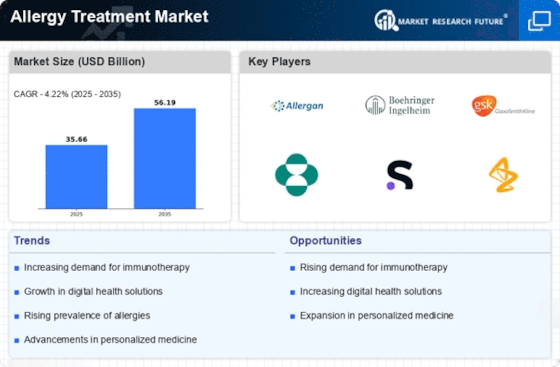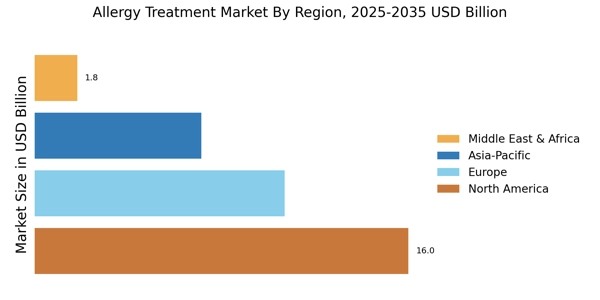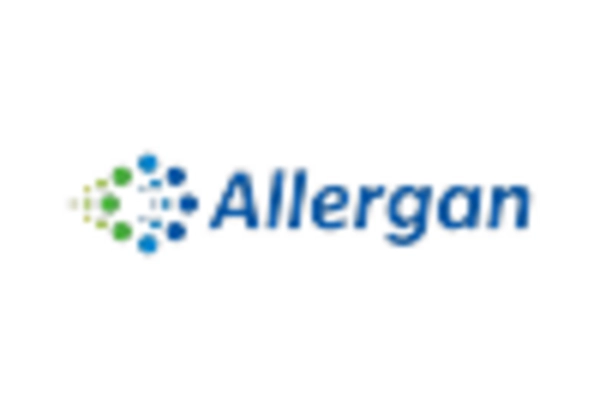Rising Allergy Prevalence
The Allergy Treatment Market is experiencing a notable surge in demand due to the increasing prevalence of allergies worldwide. Recent data indicates that approximately 30% of the global population suffers from some form of allergic condition, which includes allergic rhinitis, asthma, and food allergies. This rising incidence is attributed to various factors, including environmental changes, urbanization, and lifestyle modifications. As more individuals seek effective treatment options, the Allergy Treatment Market is likely to expand, with pharmaceutical companies and healthcare providers focusing on innovative therapies and medications to address this growing concern. Furthermore, the increasing awareness of allergies and their impact on quality of life is driving patients to seek medical advice, thereby propelling the market forward.
Increased Awareness and Education
The Allergy Treatment Market is benefiting from heightened awareness and education regarding allergies and their management. Public health campaigns and educational initiatives are informing individuals about the symptoms, triggers, and available treatments for allergies. This increased awareness is leading to more people seeking medical advice and treatment options, thereby expanding the market. According to recent surveys, a significant percentage of individuals with allergies are now more informed about their conditions and the importance of seeking timely treatment. This trend is likely to continue, as healthcare providers and organizations strive to educate the public about the implications of untreated allergies. Consequently, the Allergy Treatment Market is expected to grow as more patients recognize the need for effective management strategies.
Advancements in Allergy Treatments
Innovations in the Allergy Treatment Market are significantly shaping the landscape of allergy management. Recent advancements in immunotherapy, including sublingual and injectable options, have shown promising results in desensitizing patients to allergens. These therapies are gaining traction as they offer long-term relief and a potential cure for certain allergies. Additionally, the development of biologics, which target specific pathways in allergic responses, is revolutionizing treatment options. The Allergy Treatment Market is witnessing a shift towards personalized medicine, where treatments are tailored to individual patient profiles, enhancing efficacy and safety. As research continues to unveil new therapeutic targets, the market is poised for substantial growth, driven by the demand for more effective and targeted allergy treatments.
Technological Integration in Healthcare
The integration of technology in healthcare is transforming the Allergy Treatment Market. Digital health solutions, including mobile applications and telemedicine, are facilitating better patient engagement and management of allergic conditions. These technologies allow patients to track their symptoms, receive personalized treatment recommendations, and communicate with healthcare providers more effectively. The rise of wearable devices that monitor environmental allergens is also contributing to improved allergy management. As technology continues to evolve, the Allergy Treatment Market is likely to see increased adoption of these innovative solutions, enhancing patient outcomes and satisfaction. Furthermore, the data collected through these platforms can provide valuable insights for researchers and healthcare professionals, potentially leading to new treatment approaches.
Regulatory Support and Policy Initiatives
The Allergy Treatment Market is being positively influenced by regulatory support and policy initiatives aimed at improving allergy management. Governments and health organizations are increasingly recognizing the burden of allergic diseases and are implementing policies to enhance access to allergy treatments. This includes funding for research, subsidies for medications, and initiatives to promote awareness and education. Such support is crucial in fostering innovation within the Allergy Treatment Market, as it encourages pharmaceutical companies to invest in research and development of new therapies. Additionally, favorable regulatory environments can expedite the approval process for new treatments, allowing patients to access cutting-edge therapies more quickly. As these initiatives continue to evolve, the market is expected to expand, driven by a supportive framework for allergy management.

















